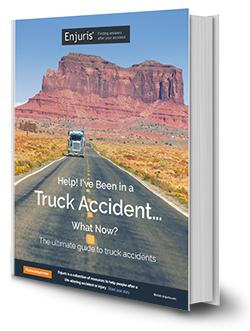Alabama truck accident statistics, common causes of truck accidents, who might be liable, what damages can be recovered, and answers to frequently asked questions
Many drivers are fearful of sharing the road with semi-trucks. This fear is understandable when you consider the fact that:
The average car is 16.4 feet long and 5,000 pounds. In contrast, the average semi-truck is 80 feet long and 80,000 pounds.
But are large commercial trucks actually more dangerous than cars?
In this article, we’ll take a look at large truck accidents in Alabama, including how they differ from car accidents and how fault is established. Finally, we’ll answer some frequently asked questions about truck accident claims in the Cotton State.
How common are truck accidents in Alabama?
Every year in the United States, there are approximately 110,000 large truck crashes that result in injuries and 5,000 large truck crashes that result in fatalities.
In Alabama, large commercial trucks travel 6.5 billion miles annually. Let’s take a look at how often these trucks are involved in accidents:
| Alabama truck accidents (2015-2019) | |||
|---|---|---|---|
| Year | Trucks involved | Injuries | Fatalities |
| 2015 | 8,484 | 2,367 | 118 |
| 2016 | 8,937 | 2,345 | 157 |
| 2017 | 9,351 | 2,563 | 101 |
| 2018 | 10,079 | 2,629 | 121 |
| 2019 | 10,486 | 2,612 | 137 |
| Source: Alabama Department of Transportation | |||
In contrast to truck accidents, car accidents occur much more frequently in Alabama. In 2019, there were nearly 160,000 car crashes, compared to the roughly 10,000 reported truck accidents. In other words, collisions and crashes with large trucks happened at 1/16th the rate of accidents between 2 or more passenger vehicles.
Common causes of big rig crashes
The Federal Motor Carrier Safety Administration (FMCSA) took a look at a massive number of large commercial truck accidents and found that the causes of truck accidents could generally be broken down into 6 categories:
| Causes of large truck crashes in the United States | ||
|---|---|---|
| Category | Percentage | Definition |
| Decision | 38% | The driver was driving too fast for conditions, misjudged the speed of other vehicles, or followed other vehicles too closely. |
| Recognition | 28% | The driver was inattentive, distracted by something inside or outside the vehicle, or failed to observe the situation adequately for some other reason. |
| Non-performance | 12% | The driver fell asleep, was disabled by a heart attack or seizure, or was physically impaired for another reason. |
| Vehicle | 10% | Vehicle failures, such as brake problems, were responsible for the crash. |
| Performance | 9% | The driver panicked, overcompensated, or exercised poor directional control. |
| Environment | 3% | Fog, heavy rain, bad weather, or roadway problems caused the crash. |
| Source: FMCSA large truck causation study | ||
The Alabama Department of Transportation took a narrower look at all crashes involving large trucks in Alabama in 2019 and found the following primary causes:
| Primary cause of truck accidents in Alabama (2019) | ||
|---|---|---|
| Primary cause | Crashes | Percentage of all truck crashes |
| Improper lane change | 1,558 | 14.8% |
| Failed to yield right of way | 1,047 | 10.0% |
| Unseen object, person, or vehicle | 862 | 8.2% |
| Tailgating | 783 | 7.5% |
| Misjudged stopping distance | 531 | 5.1% |
| Improper backing | 426 | 4.1% |
| Defective equipment | 417 | 4.0% |
| Improper turn | 402 | 3.8% |
| Avoiding animal, object, or person | 366 | 3.5% |
| Failure to heed signs or signals | 289 | 2.8% |
| Crossed median | 283 | 2.7% |
| Driving too fast for conditions | 226 | 2.2% |
| Fatigued or fell asleep | 202 | 1.9% |
| Improper passing | 192 | 1.8% |
| Ran off-road | 144 | 1.4% |
| Driving under the influence | 125 | 1.2% |
| Over the speed limit | 79 | 0.7% |
| Other | 2,554 | 24.3% |
| Total | 10,486 | 100% |
The National Transportation Safety Bureau (NTSB) report found that the semi-truck driver was at fault for failing to stop. The families of some of the deceased filed lawsuits against the trucking company, alleging that the driver was negligent for driving too fast for the conditions and for failing to stop for traffic.
Proving fault in an Alabama truck accident case
To recover damages after a truck accident in Alabama, you need to prove that someone else was at fault for your accident. In most cases, this means establishing these 3 elements of negligence:
- Duty. You must prove that the defendant owed you a duty of care. All drivers have a duty to exercise reasonable care to avoid harming all others on the road.
- Breach. You must prove that the defendant breached their duty of care. A breach occurs when the defendant fails to meet the standard of care required.
- Causation. You must prove that your injury was caused by the defendant’s breach of the standard of care.
Common examples of truck driver negligence include:
- A truck driver who runs a red light
- A truck driver who texts while driving
- A truck driver who falls asleep while driving
- A truck driver who fails to secure their cargo
Who’s liable for a truck accident?
Most truck accident lawsuits are filed against truck drivers, but other parties can be negligent as well. These parties include:
- The manufacturer of the truck or truck components
- The person or company responsible for loading the ship's cargo
- The entity tasked with maintaining the road on which the truck was traveling
Damages available in an Alabama truck accident case
Although large commercial trucks don’t crash as often as cars, they tend to cause more damage when they do crash.
In Alabama, truck accident victims can collect the following damages:
- Economic damages represent the monetary losses caused by an accident (for example, medical expenses, lost wages, and property damage).
- Non-economic damages represent the non-monetary losses caused by an accident (for example, pain and suffering).
- Punitive damages are intended to punish the defendant. Punitive damages are only available in cases in which the defendant acted intentionally.
How does insurance impact a truck accident claim?
All motorists in Alabama are required to maintain the state’s minimum amount of liability insurance coverage, which is:
- $25,000 for bodily injury for the death of 1 person,
- $50,000 for bodily injury for the death of 2 or more people in any one accident, and
- $25,000 for damage for the destruction of property in one accident
If you’re involved in an accident caused by a truck driver, you have 2 options:
- File an insurance claim against the truck driver’s insurance, or
- File a personal injury lawsuit against the truck driver (at which point the insurance company will defend the truck driver so long as coverage may apply).
Keep in mind that the insurance company is only responsible for damages up to the limits of the policy. If your damages exceed the policy limits, you’ll need to collect the excess amount from the truck driver or the trucking company personally.
Alabama truck accident statute of limitations
Alabama has a 2-year statute of limitations for most truck accident claims. This means you generally have 2 years from the date of the accident to file a lawsuit. If you fail to file a lawsuit within this period, you will (with very few exceptions) be forever barred from filing a lawsuit based on the accident.
Frequently asked questions about truck accident cases
Still have questions?
Let’s see if we can address a few of them:
What are the common types of truck accidents?
Due to the size and nature of 18-wheelers, there are a few types of accidents that are particularly common:
- Jackknife truck accidents. This type of accident occurs when a truck with 2 separate parts (a cab and a trailer) folds in on itself at the joint. Jackknife accidents typically occur as a result of sudden stopping, improper lane changes, or dangerous road conditions.
- Underride accidents. An underride accident occurs when a smaller vehicle crashes into the side or back of a tractor-trailer and slides underneath.
- Hazardous material accidents. Many trucks transport hazardous materials (such as gasoline or pesticides). When these trucks crash, the hazardous materials can become unsecured and impact other drivers on the road and even the people living in the surrounding area.
How do I avoid a truck accident?
You can avoid a truck accident by doing many of the same things you do to avoid a car accident. For example, watch your speed, pay attention to the weather, and avoid distractions.
Rob Lyons, a commercial truck driver for 17 years and former director of the Sage Technical Services truck driving school, says that he constantly watches the road and his own car in what he calls a scan pattern: left mirror, straight ahead, right mirror, straight ahead, gauges; then repeat.
What steps should I take after a truck accident?
If you’re involved in a truck accident, there are some things you can do to help ensure your safety and increase your chances of recovering damages down the road:
- Call an ambulance if you or anyone else involved in the crash is seriously injured
- Call the police so they can conduct an investigation and file a report
- Take photographs of the scene and any injuries
- Collect the contact information for any witnesses
- Avoid posting about the accident on social media
- Get checked out by your doctor (even if you don’t think you were seriously hurt)
- Schedule an initial consultation with a personal injury attorney
How much does a truck accident lawyer cost?
The vast majority of truck accident attorneys work on a contingency basis, which means they receive a percentage (typically 20-40%) of whatever damages you’re ultimately awarded. If you’re not awarded any damages, you typically don’t owe the attorney any money.
How do I find a truck accident attorney?
You can find an experienced truck accident attorney using our free online legal directory. Most initial consultations are free, so there’s no reason not to meet with an attorney as soon as possible.
Did you know that truck accident law varies by state?
Need a lawyer?
What does an injury lawyer do?
A personal injury lawyer helps individuals who have sustained injuries in accidents to recover financial compensation. These funds are often needed to pay for medical treatment, make up for lost wages and provide compensation for injuries suffered. Sometimes a case that seems simple at first may become more complicated. In these cases, consider hiring an experienced personal injury lawyer. Read more















